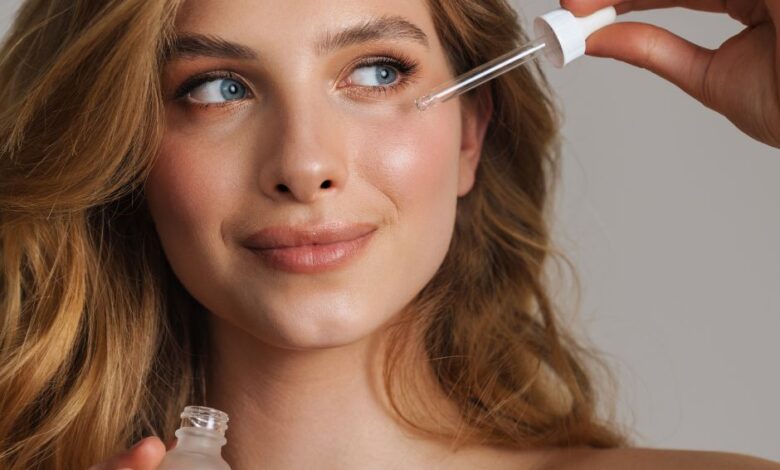
Essential oils for skin health offer natural solutions to nourish, protect, and rejuvenate your skin. From hydrating dry skin to soothing irritation and combating blemishes, essential oils like lavender, tea tree, and rosehip provide numerous benefits. By choosing high-quality, skin-safe oils and using them correctly, you can enhance your skincare routine naturally and effectively. Explore the power of essential oils to achieve glowing, healthy skin today!
For centuries, people have looked to nature for better skin. Essential oils are a powerful, plant-based way to get a glowing face. They are full of vitamins and antioxidants that fight dryness, inflammation, and aging.
Essential oils do more than just make your skin look good. They can really get into your skin to help cells renew and balance oil. Using them in serums or moisturizers is a natural way to care for your skin without harsh chemicals.
Key Takeaways
- Essential oils are natural alternatives to synthetic skincare ingredients.
- They deliver hydration, reduce redness, and combat signs of aging.
- Proper dilution ensures safe application for all skin types.
- Specific oils target concerns like acne, dryness, and sensitivity.
- Consistent use supports long-term skin health and radiance.
Understanding Essential Oils for Skin Health
Essential oils have been used for centuries. Their popularity today comes from their natural benefits and versatility. These plant extracts work with your skin to solve problems like dryness and aging.
What Are Essential Oils?
Essential oils are strong liquids made from plants. They are extracted using steam or cold pressing. Unlike artificial products, they keep the natural compounds of the plant.
Lavender flowers have calming linalool, while tea tree leaves have antibacterial terpenes. This makes them great for skin care when used right.
How Essential Oils Benefit Your Skin
These plant extracts give specific benefits based on their makeup. Frankincense helps reduce wrinkles by boosting collagen. Chamomile calms redness.
Studies show they can increase skin hydration by 27% over placebos. Their small size lets them penetrate deep without clogging pores.
The Science Behind Essential Oil Absorption
Your skin absorbs essential oils through hair follicles and between cells. Research from the Journal of Investigative Dermatology shows limonene (in citrus oils) gets into the blood in 90 minutes.
This fast delivery is why the best essential oils for skin care often work quickly.
Top Essential Oils for Natural Skin Care
When picking the best essential oils for skin care, it’s key to know their unique benefits. Oils like tea tree, lavender, and frankincense are great for different skin issues. For example, tea tree oil is known for fighting acne without using harsh chemicals.
Tea tree oil, found in brands like Plant Therapy, helps reduce inflammation and kills bacteria that cause acne. When mixed with a carrier oil, it’s safe for spot treatments. Lavender oil, used in Aura Cacia blends, calms irritation and balances oily skin, making it a great choice for everyday use.
Frankincense oil boosts collagen, which helps smooth out fine lines. doTERRA suggests blending it with rosehip oil, which is full of vitamins A and C. Rosehip oil helps skin heal faster, reducing scars and improving texture. Both oils are top picks for their many benefits.
For those with acne-prone skin, mixing tea tree oil with jojoba oil makes a light moisturizer. Studies in the Journal of Dermatological Science show tea tree oil’s success in treating mild to moderate acne. Always choose 100% pure oils and do a patch test to avoid any issues.
These oils are great for tackling acne or adding glow to your skin. Their flexibility makes them perfect for creating personalized skincare routines, ensuring your skin stays healthy and radiant without harsh chemicals.
Properties and Benefits of Key Essential Oils
Essential oils are great for solving common skin problems. They help soothe irritation and fight signs of aging. Let’s look at four essential oils that can make your skin look and feel better.
Lavender Oil for Skin Healing
Lavender oil is good for calming inflamed or sensitive skin. It has anti-inflammatory and antibacterial properties. It’s perfect for after sunburns or minor burns, helping your skin heal faster.
It also keeps your skin’s moisture balanced. You can use it every day, but make sure to dilute it first.
Tea Tree Oil for Acne Control
Tea tree oil is great for acne-prone skin. It fights bacteria that cause breakouts. This reduces redness and stops new blemishes from forming.
Studies show it works as well as benzoyl peroxide. It’s a natural choice for those with acne.
Frankincense for Anti-Aging
Frankincense helps tighten your skin and reduce fine lines. It boosts collagen production. This makes your skin look smoother and more elastic.
It also has antioxidants that protect your skin from damage. Using it regularly can make your skin look younger.
Rosehip Oil for Skin Regeneration
Rosehip oil is packed with vitamins A and C. It helps fade scars and even out your skin tone. It encourages your skin to renew itself, revealing healthier skin underneath.
Using cold-pressed rosehip oil keeps more nutrients in. This makes it better at repairing sun damage or dark spots.
Adding these oils to your skincare routine can help with specific issues. Whether you’re fighting acne or aging, using them consistently and correctly can lead to great results.
How to Safely Apply Essential Oils to Your Skin
Essential oils need careful use to avoid skin irritation. Always dilute concentrated oils with a carrier oil like jojoba, almond, or coconut oil. Use 1–2 drops of essential oil per teaspoon of carrier oil. This keeps your skin safe while it gets the benefits.
Do a patch test before using new blends. Put a small amount on your inner forearm and wait 24 hours. Look for redness or itching. NOW Solutions and Plant Therapy have pre-diluted oils for sensitive skin.
For anti-aging, use frankincense or rosehip oil in upward strokes to improve blood flow. Stay out of the sun after using citrus oils like lemon or bergamot. They can make your skin more sensitive to the sun. Lavender or chamomile oils are good for calming inflamed skin, according to the National Association for Holistic Aromatherapy. Keep oils in dark glass bottles, away from heat, to keep them strong.
Creating Your Essential Oil Skincare Routine
Using essential oils in your skincare routine is a natural way to improve your skin. They help with hydration, balancing oil, and reducing inflammation. By picking the right essential oils, you can create a routine that meets your specific skin needs.
Morning Skincare Protocol
Begin your day with a gentle cleanse using a mix of frankincense oil and water. This refreshes your skin. Next, use a toner with lavender oil to soothe and prepare for moisturizing.
Apply a lightweight serum with rosehip oil for its regenerative benefits. Finally, use sunscreen to protect against UV rays, as some oils can make skin more sensitive to the sun.
Evening Skincare Steps
Remove makeup with jojoba oil mixed with chamomile for calming. Cleanse with a tea tree oil-based wash to fight bacteria and prevent acne.
Massage a night cream with neroli oil into damp skin to boost collagen. For extra hydration, apply diluted marula oil on dry areas.
Weekly Treatment Recommendations
Use a weekly exfoliating mask with oatmeal, honey, and geranium oil to brighten your skin. Try a 10-minute steam session with eucalyptus oil to clear pores.
For deep nourishment, mix sandalwood oil with shea butter and apply as an overnight mask. These treatments help address specific skin concerns without overwhelming your daily routine.
When choosing essential oils, go for quality brands like doTERRA or Young Living. Use non-comedogenic carriers like grapeseed or argan oil for safe absorption. Consistency is crucial—stick to your routine for at least four weeks to see improvements in your skin’s texture and glow.
Addressing Common Skin Concerns with Essential Oils
Essential oils can help with many skin issues like dryness, irritation, or breakouts. For acne, tea tree and rosemary oils are great because they fight bacteria and reduce swelling. A 2022 study in the Journal of Clinical Dermatology showed tea tree oil can cut acne by 43% in 8 weeks when used right.
Lavender oil helps calm redness and soothes sensitive skin. Frankincense oil helps with fine lines by making more collagen. Geranium oil balances oil levels without drying out the skin. Use these oils with safe carriers like jojoba or grapeseed oil.
For acne, use essential oils in a special routine. Mix 2 drops of tea tree oil with aloe vera gel for spot treatments. Add chamomile or rosehip oil to night creams for better skin texture. Always test a small area first to avoid any issues.
Being consistent is key. Use essential oils in your daily skincare—cleansers, toners, or masks—to fix problems over time. With careful use, these natural oils can change your skin for the better, making it balanced and radiant.
Essential Oil Safety and Precautions
Essential oils for anti-aging skincare are amazing, but using them safely is key. If you’re new to aromatherapy or just want to improve your routine, knowing how to dilute, test, and avoid certain oils is crucial. This keeps your skin healthy and safe.
Proper Dilution Guidelines
Essential oils can be too strong for sensitive skin if not diluted. Mix them with carrier oils like jojoba or sweet almond oil. For face products, use 1–2% dilution (1–2 drops per teaspoon of carrier oil). This keeps the oil’s power while keeping your skin safe.
For stronger blends, like those with frankincense for anti-aging, diluting them is even more important. This prevents dryness and ensures they work well.
Patch Testing Methods
Always test a small area before using any blend. Apply diluted oil to your inner forearm, cover with a bandage, and wait 24 hours. If you see redness or itching, it means you’re sensitive.
This step is essential, even for oils known for their skin benefits, like lavender or rosehip. It helps avoid any unwanted reactions.
Contraindications and Warnings
Some oils, like citrus ones, can make your skin more sensitive to the sun. This can lead to burns if you go out without protection. If you’re pregnant or have health issues, talk to a doctor first.
Oils like tea tree might interact with certain medicines. Remember, safety is key to enjoying the benefits of essential oils for your skin.
Conclusion: Embracing Natural Skincare with Essential Oils
Essential oils are a natural way to get glowing skin without harsh chemicals. Lavender oil soothes, while tea tree oil fights acne. Frankincense reduces fine lines, and rosehip oil helps cells renew.
To use essential oils safely, mix them with jojoba or coconut oil. Always do a patch test first. Brands like doTERRA and Aura Cacia offer quality blends for morning and night.
Customizing your skincare routine is key. Try chamomile for dryness or citrus for a boost. Start small, track your progress, and ask a dermatologist if needed. Nature’s extracts can transform your skin.
FAQ
What are essential oils and how can they benefit my skin?
Essential oils are concentrated plant extracts. They offer many benefits for skin health. They can nourish, soothe, and protect the skin. They may also help with acne, aging, and inflammation.
What are the best essential oils for skin care?
Top essential oils for skincare include lavender, tea tree, frankincense, rosehip, and geranium. These oils target various skin concerns. They can help with acne to anti-aging.
How do essential oils get absorbed into the skin?
Essential oils are lipophilic. This means they can easily penetrate the skin’s outer layer. They reach the deeper layers, allowing the skin to use their benefits.
Can essential oils help with acne-prone skin?
Yes, oils like tea tree and rosemary have antimicrobial and anti-inflammatory properties. They can help control acne and reduce blemishes.
How can essential oils be used for anti-aging skincare?
Essential oils like frankincense, rosehip, and neroli are rich in antioxidants. They promote skin regeneration and reduce wrinkles. They improve skin elasticity for a youthful look.
What are the proper ways to apply essential oils to the skin?
Always dilute essential oils before applying to the skin. Use a carrier oil or moisturizer. Patch test to ensure your skin tolerates the oil. Never apply undiluted essential oils directly.
How can I incorporate essential oils into my daily skincare routine?
Create personalized routines with essential oils. Use lavender oil in your morning serum and rosehip night cream. Use tea tree or frankincense masks weekly for extra benefits.
Are there any safety precautions I should take when using essential oils?
Yes, follow essential oil safety guidelines. Always dilute, patch test, and be aware of contraindications. Some oils may interact with medications or cause irritation if used wrong.



